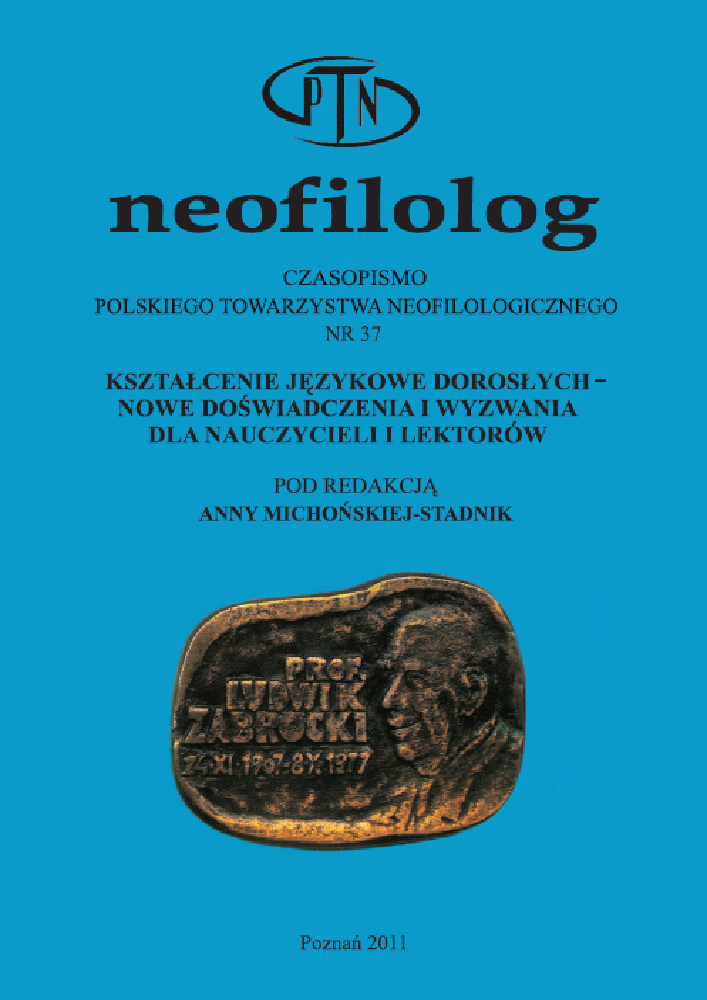Abstrakt
The article aims at presenting a longitudinal two-year study on the per-ception of language learning from the perspective of five adult learners in their late 50s who are teacher consultants by profession and participants of an elementary course in English. The attention is focused on two as-pects: 1) what general expectations they have with regard to the course (ie. language skills, knowledge, teacher, etc.) at the beginning of their learning process, 2) what they achieve or fail to achieve after two years of attending the course. The conclusions may provide some implications for language teachers of mature learners as well as future directions for re-searchers of this topic.
Bibliografia
Alanen, R. 2006. „A sociocultural approach to young language learners’ beliefs about language learning”. (w:) Kalaja, P. i Barcelos, A. M. F. (red). Beliefs about SLA: New Research Approaches. New York: Springer: 55-86.
Bailey, K. M. 1995. „Competitivenss and anxiety in adult second language learn-ing: looking at and through the diary studies”. (w:) Brown, H. D i Gonzo, S. (red). Readings on Second Lnaguage Acquisition. Upper Saddle River, NJ: Prentice Hall Regents.
Barcelos, A. M. F. 2006. „Teachers’ and students’ beliefs within a Deweyan frame-work: conflict and influence”. (w:) Kalaja, P. i Barcelos, A. M. F. (red). Beliefs about SLA: New Research Approaches. New York: Springer: 171-200.
Bellingham, L. 2005. „Is there language acquisition after 40? Older learners speak up”. (w:) Benson, P. i Nunan, D. (red). Learners’ Stories. Cambridge: CUP: 56-68.
Bernat, E. i Gvozdenko, I. 2005. „Beliefs about language learning: Current knowledge, pedagogical implications and new research dimensions”. TESL-EJ. 9(1). http://www-writing.berkeley.edu?TESL-EJ/ej33/al.html DW: 02.01.2011.
Block, D. 2007. Second Language Identities. London: Continuum.
Dufva, H. 2006. „Beliefs in dialogue: a Bakhtinian view”. (w:) Kalaja, P. i Barce-los, A. M. F. (red). Beliefs about SLA: New Research Approaches. New York: Springer: 131-152.
Eriksen, T. H. 2003. Tyrania chwili. Warszawa: PIW.
Ho, D. G. E. 2007. Classroom Talk. Bern: Peter Lang.
Horwitz, E. K. 1985. „Surveying student beliefs about language learning and teaching in the foreign language methods course”. Foreign Language An-nals. 18(4): 333-340.
Hosenfeld, C. 2006. „Evidence of emergent beliefs of a second language learn-er”. (w:) Kalaja, P. i Barcelos, A. M. F. (red). Beliefs about SLA: New Re-search Approaches. New York: Springer: 37-54.
Kalaja, P., Menezes, V. i Barcelos, A. M. F. 2008. Narratives of Learning and Teach-ing EFL. Basingstoke: Palgrave Macmillan.
Knowles, M. 1975. Self-Directed Learning. A Guide for Learners and Teachers. New York: Englewood Cliffs.
Kramsch, C. 2006. „Metaphor and the subjective construction of beliefs”. (w:) Kalaja, P. i Barcelos, A. M. F. (red). Beliefs about SLA: New Research Ap-proaches. New York: Springer: 109-128.
Lantolf, J. P. 2000. Sociocultural Theory and Second Language Learning. Oxford: OUP.
Lantolf, J. P. i Pavlenko, A. 2001. „(S)econd (L)anguage (A)activity theory: un-derstanding second language learners as people”. (w:) Breen, M. P. (red). Learner Contributions to Language Learning. Harlow: Pearson: 141-158.
Larsen-Freeman, D. 2001. „Individual cognitive/affective learner contributions and differential success in second language acquisition”. (w:) Breen, M. P. (red). Learner Contributions to Language Learning. Harlow: Pearson: 12-24.
Little, D. 1991. Learner AutonomyI: Definitions, Issues and Problems. Dublin: Authentik.
Lortie, D. 1975. School Teacher. A Sociological Study. Chicago: University of Chica-go Press.
Malewski, M. 2010. Od nauczania do uczenia się. O paradygmatycznej zmianie w andra-gogice. Wrocław: Wydawnictwo Naukowe Dolnośląskiej Szkoły Wyższej.
Norton, B. 2010. „Language and Identity”. (w:) Horngerger, N. H. i McKay, S. L. (red). Sociolinguistics and Language Education. Bristol: Multilingual Matters: 349-369.
Oxford, R. 1999. „Anxiety and the language learner”. (w:) Arnold, J. (red). Affect in Language Learning. Cambridge: CUP.
Singleton, D. i Ryan, L. 2004. Language Acquisition: The Age Factor. Clevedon: Multilingual Matters.
Shoaib, A. i Dornyei, Z. 2005. „Affect in lifelong learning: Exploring L2 motiva-tion as a dynamic process”. (w:) Benson, P. i Nunan, D. (red). Learners’ Stories. Cambridge: CUP: 22-41.
Wilczyńska, W. i Michońska-Stadnik, A. 2010. Metodologia badań w glottodydaktyce. Kraków: AVALON.
Licencja
Prawa autorskie (c) 1970 Dorota Werbińska

Utwór dostępny jest na licencji Creative Commons Uznanie autorstwa – Bez utworów zależnych 4.0 Międzynarodowe.
Przedstawiany utwór (artykuł) upubliczniany jest na podstawie umowy z autorem i na licencji Creative Commons Attribution-NoDerivatives 4.0 International (CC BY-ND 4.0).
Użytkownicy mają obowiązek podania wraz z rozpowszechnionym utworem, informacji o autorstwie, tytule, źródle (odnośniki do oryginalnego utworu, DOI) oraz samej licencji;
- bez tworzenia utworów zależnych,
- utwór musi być zachowany w oryginalnej postaci.
Uniwersytet im. Adama Mickiewicza w Poznaniu zachowuje prawo do czasopisma jako całości (układ, forma graficzna, tytuł, projekt okładki, logo itp.).
